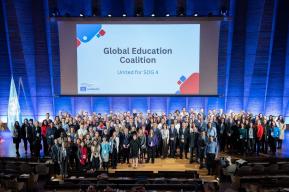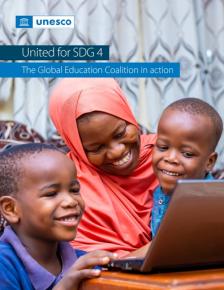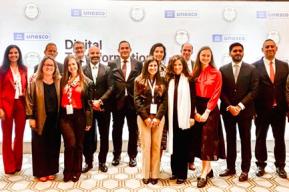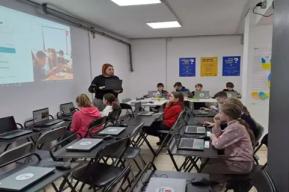News
UNESCO’s Global Education Coalition: New report highlights the key role of multi-stakeholder collaboration to achieve education goals

The Global Education Coalition is a unique open platform with agile coordination methods that facilitate collaboration between members to scale up programming and achieve common goals for the acceleration of Sustainable Development Goal 4.
As the Coalition enters its fifth year with 222 partners working across 112 countries, this year's annual meeting is dedicated to increasing partner commitment to collaborative projects that align with the Transforming Education Summit and advance progress towards the education 2030 agenda.
“While the Global Education Coalition was established during the COVID-19 pandemic, this report demonstrates just how critical this platform remains today in bringing together diverse stakeholders to address the pressing global education crisis,” said Borhene Chakroun, Director of Policies and Lifelong Learning Systems Division and coordinator of the Global Education Coalition at UNESCO.
The 2024 report covers the fourth year of action for the Coalition, including how its subgroup, the Digital Transformation Collaborative, successfully launched its first country collaborations as it works to advance the high-level agenda set at the Transforming Education Summit.
“In addition to mobilizing resources and support in times of crisis, our members are collaborating to deliver creative solutions that accelerate progress towards the 2030 education goals," said Mr Chakroun.
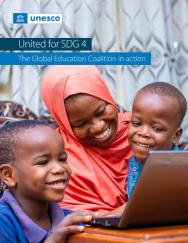
Mobilized to address education challenges
As many as one in four of the world’s primary schools still lack electricity and only 40% are connected to the Internet. Additionally, as highlighted in last year’s Global Education Monitoring Report, only 45% of lower secondary school teachers feel prepared to use technology to teach, even after receiving training.
Looking beyond the digital divide, more than one in five (23.5%) young people aged between 15 and 24 are not in education, employment or training. And, despite progress, women still account for nearly two-thirds of the 763 million adults without basic literacy skills, while girls are more at risk of early and unintended pregnancy, early and forced marriage, and violence when they do not go to school.
The report demonstrates how the Coalition’s four missions – Global Skills Academy, Global Teacher Campus, Global Learning House, and Driving gender-transformative education – continue to grow and, through strategic partners, are catalyzing action to support education systems worldwide.
Since its establishment, the Coalition has helped over more than 858,000 youth develop employability skills, trained over 794,000 teachers, and reached at least 2,450,000 of the most marginalized girls and women.
Through the mobilization of private sector partners and a network of volunteer teachers and educators, more than one million learners now have access to resources to help develop foundational skills and support for subjects they find challenging at school.
- UNESCO’s Global Education Coalition
- Coalition’s annual meeting
- Coalition’s new annual report



